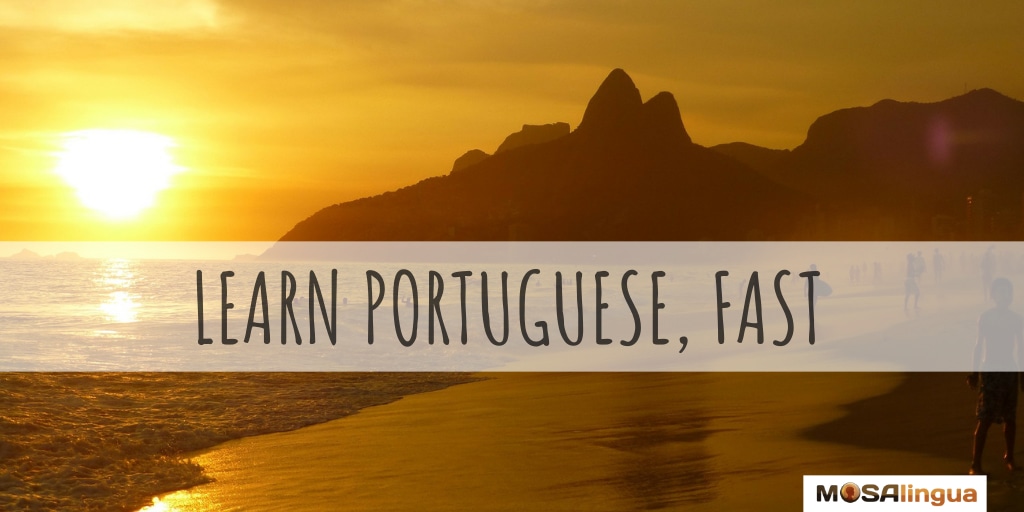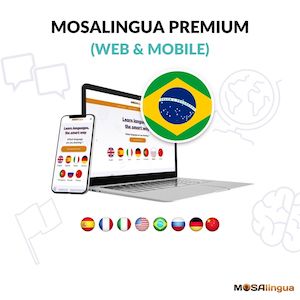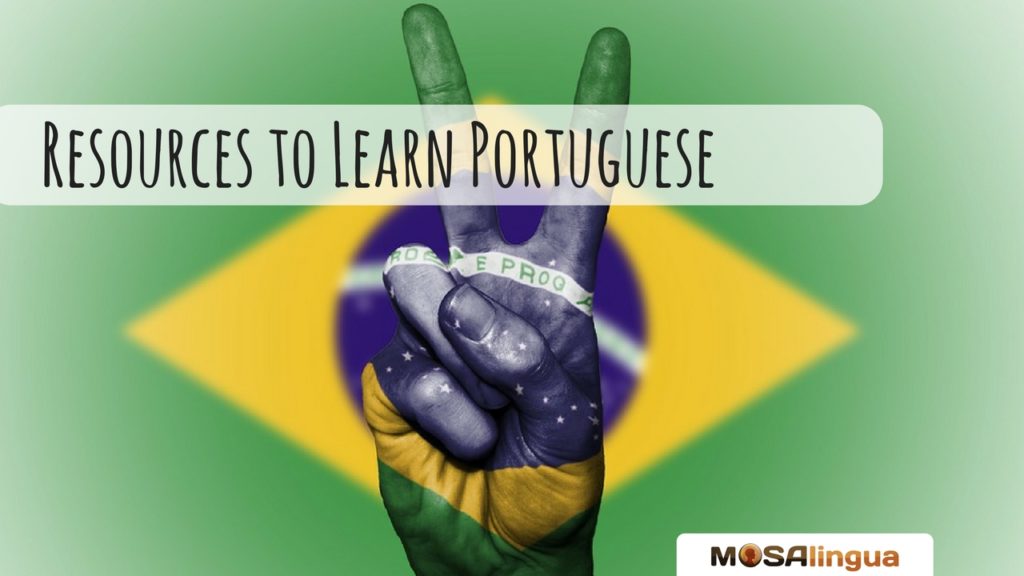Last Updated: 05/31/2023
Brazilian vs. Portugal Portuguese
First things first, some housekeeping. You might be wondering which variety of Portuguese to learn—Brazilian Portuguese (do Brasil) or European Portuguese (do Portugal). We urge our users to learn Brazilian Portuguese. Why?
We are operating on the assumption that you’re more likely to hear Brazilian Portuguese. Portuguese is one of the most-spoken languages in the world (click here to find out where it ranks), but only 5% of Lusophones actually live in Portugal! This is a choice we made to make it easier for you to understand the language wherever you go! The two dialects use the same structure and most of the same vocabulary, so pronunciation is the only real challenge.
On This Page…
5 Easy Ways to Learn Portuguese Fast
Portuguese really isn’t as difficult as you think it is! With these 5 tips, we’ll teach you the easy way to learn Portuguese quickly and enjoy doing it. Ready? Vamos!
Tip #1: Listen to Brazilian music
Brazilian music is popular all over the world. Why? For one, it is particularly rich and diverse: samba, bossa nova, forró, música sertaneja, jazz, rock, funk carioca, etc. Whether you like fast-paced dance music or slower jams, poetic lyrics or songs about everyday life, Brazilian music has it!
So, our first tip to learn Portuguese fast is to listen to Brazilian music, every day if possible. And by “listen,” we really mean active listening, not just putting it on as background music. (Although we don’t discourage you from doing this as well! Any degree of exposure will help you get your ear used to the language.)
Listening to music with lyrics has so many benefits. It helps you improve your listening comprehension, enrich your vocabulary, improve your pronunciation, and understand the structure of the language.
I bet you didn’t know that music could do so much good, did you? 😉
💡 How to learn Portuguese fast with music: Since Brazilian songs are so catchy, you’ll want to listen to them over and over again. And the more you listen, the more quickly you’ll learn Portuguese! Be sure to pair your listening practice with vocabulary and reading comprehension work with the song’s lyrics. This ensures that you sing the right words and know what you’re singing about!
What tools can I use to learn Portuguese with music?
It’s easy to find songs with lyrics on YouTube. (By the way, YouTube in general is a great resource for practicing your language skills – here are 5 Portuguese YouTube channels we love.) Just type the name of a song you like + lyrics.
If you don’t know any Brazilian songs or artists, start with Arlindo Cruz (video above)! We guarantee you’ll be hooked.
We also like Letras, a Brazilian music site. Not all of the songs they feature are actually in Portuguese, but it’s still good for immersion (see tip #4 for more on that).
You can also check out our article about learning a language with music for some other recommendations of tools and websites for practicing your Portuguese while you rock out.
Start improving your Portuguese today
Want to improve your Portuguese?
Good news: we can help!
More good news: you can get started for free! With your free trial, you can test drive the most effective method for learning Portuguese for the next 15 days !Vocabulary flashcards, videos with subtitles, audiobooks, articles adapted to your level – with MosaLingua Premium (Web & Mobile), you’ll have access to all this and more. Get started right now. It’s free—and risk-free—to try!
Tip #2: Watch Brazilian TV shows
After singing and dancing for a while, you should take a little break to rest… and put on a Brazilian TV show! That way you’ll stay in your Brazilian immersion bubble.
Watching a Portuguese TV series (click here to see our favorites) will help you get used to the Brazilian accent. You’ll also improve your listening comprehension and pronunciation, and enrich your vocabulary (including important Portuguese slang).
💡 How to learn Portuguese fast with Brazilian TV: Choose a series with lots of short episodes. Once you get hooked, you’ll want to binge-watch it (like we did with Cidade dos Homens), and you’ll end up learning the language at lightning speed! There are quite a few great Brazilian and Portuguese shows out there, so if the first one you watch doesn’t suck you in, keep looking.
A little trick: If you’re a beginner, feel free to start watching these series with English subtitles. Use them along with Portuguese subtitles to work on reading comprehension. And when you feel ready (try not to wait too long), watch the same episodes again without subtitles. This way, you won’t be completely lost and you’ll still enjoy the activity, but you’ll also practice important language skills.
What about Brazilian Portuguese movies?
Movies are best for upper-intermediate and advanced learners. We recommend TV shows for beginner and intermediate learners because:
- They are short, so you’re less likely to lose focus even if you are having trouble understanding. It also means that you can watch them several times in a short amount of time – once with subtitles, once without.
- You have more time to get used to different accents and vocabulary since the same characters and scenarios tend to come up over and over
- There’s more material to practice your Portuguese with since seasons are usually 10-20 episodes long
- They’re often addictive!
That said, if you have reached a higher level or are a movie buff, check out our list of the best Brazilian films to learn Portuguese fast.
Tip #3: Use Chrome extensions to immerse yourself in Portuguese
MosaDiscovery® is MosaLingua’s proprietary browser extension to help you learn and memorize words directly in the context in which you found them.
Don’t understand a word you just read? Want to make sure you don’t forget it for the next time you come across it? Simply click it, translate it, and then save it as a new flashcard. All your content ends up in one convenient place.
You’ll need a MosaLingua Premium (Web & Mobile) subscription to access it – click here to learn more. It only costs a few bucks a month and includes MosaDiscovery but also tons of articles, music, videos, and other exclusive Portuguese resources to boost your studies.
💡 Why browser extensions can help you learn Portuguese faster: They allow you to multitask! Instead of just sitting down and learning the words you think you’ll need to know in the future, you can learn new vocabulary as you need it. That’s why we strongly recommend learning new vocabulary “in the wild.” Plus, you’re more likely to stick with a language if it’s useful to you right away.
Sometimes it can be hard to find websites and online articles in Portuguese that match your interests. We give you some great places to start on our Portuguese resources page (and even more in MosaLingua Premium).
Another easy way to read web content in your target language is to use the Google Translate browser extension. Find any English article or page you’re interested in, and use the extension to switch everything to Portuguese in mere seconds. Just be careful, these translations aren’t always accurate. It’s best to read things that were originally written in Portuguese whenever possible.
Tip #4: Learn full sentences, not isolated words
To speed up your learning, a great trick is to not only memorize vocabulary words, but to learn full sentences. Apply this tip to the first three strategies we gave you.
Focus specifically on sentences that will help you out in conversation. When we learn any language, we always start by learning very simple phrases such as: “My name is Henry,” “I live in New York,” “I have a dog.”
Learn sentences like these in Portuguese, then go even further by learning more complex sentences that you can reuse. (Check out our article on deconstructing language for more info on that.)
Here are some examples:
If you are planning a trip to Brazil, for example, learn complete sentences such as:
“I would like to book a room for two people” ➡️ “Gostaria de reservar um quarto para duas pessoas”
or
“Where is the closest beach?” ➡️ “Onde é a praia but próxima?“
Then, when you need to talk about the beach—for example, if you want to know what time the beach closes, or what beach your new Brazilian friend recommends—or make a different kind of reservation (dinner, an excursion, or a play for example), you’ll already have some of the vocab you need, without any extra effort! This can save you a lot of time in the long run.
Where and how to learn Portuguese vocabulary
If you’re a beginner, start by learning the most common Portuguese vocabulary words and phrases.
Of course, watching Portuguese TV series or listening to Brazilian music will help you learn complete sentences in Portuguese.
If traveling is your main learning goal, download our free Brazilian Portuguese conversation guide. It will help you through your first conversations in Portuguese.
And of course, download the MosaLingua app (learn more about it below) to memorize other common and useful phrases.
In this video, Abbe gives you 7 great strategies to learn Portuguese vocabulary faster. There are even subtitles in Portuguese if you’re really committed to learning the language quickly! Check it out right here or on our YouTube channel.
Tip #5: Be consistent
Consistency is key if you want to make progress. You won’t become fluent overnight, no matter how much you cram.
If fluency (or even just simple communication) is your goal, you have to remember the vocabulary you learn. To get new words and phrases to stick into your memory over the long term, you need to learn them and then review them on a regular basis.
To learn more about how your memory works and how to best leverage technology, take a look at our article on the Spaced Repetition System. In a nutshell, to learn Portuguese quickly, you need to practice a little bit every day.
💡 How to make sure you study consistently: Take on a 30-day Portuguese challenge. Essentially, you should make a public commitment (on your Facebook, blog, or just by telling friends and family) to study Portuguese every day for 30 days in a row. This is one of the best ways to build a new language learning habit, because after 30 consecutive days of practice, the activity you choose will feel automatic! Click here to find out more about how it works and how to hold yourself accountable.
You can also watch Alizah’s video for a recap:
There are lots of other tips to boost your Portuguese skills on the MosaLingua YouTube channel! To make sure you don’t miss any of our language tricks, subscribe to our channel.
Our Favorite Resources to Help You Learn Portuguese Fast
Now you know 5 easy ways to learn Portuguese quickly.
If you’re still not convinced that Brazilian Portuguese is the language for you, here are 11 great reasons to learn it.
In this second part, we will provide you with a set of resources to help you apply them to your daily life. Get links to our free resources page as well as our most popular articles on the subject. Plus, learn more about the MosaLingua Learn Portuguese app.
Our free resources page for learning Portuguese fast
We put together a special page with all of the best resources to learn Portuguese, and you’re going to want to bookmark it!
When we talk about resources, we mean tools that will help you make progress in one way or another. Some will help you work on your reading comprehension, others your listening comprehension. Some boost your written expression and others help develop your speaking skills.
Naturally, these tools take different forms. They can be websites, Portuguese dictionaries, YouTube channels, TV channels, guides to help you find a Portuguese conversation partner, apps, and more. To access all of these free tools, click the picture below to head over to our resources page.
Further reading
- 👂 The Most Entertaining Activities for Brazilian Portuguese Listening Practice – Learn about all of the different (and fun!) ways to improve your Portuguese listening skills from the comfort of your own home.
- 🔎 The Top 4 Online Portuguese Dictionaries – A great Portuguese-to-English dictionary is an essential tool for language learners. We tried just about every online English-to-Portuguese dictionary out there and chose our favorites.
- 🎧 Our Favorite Podcasts for Learning Portuguese – Podcasts, especially those designed for learners, can be excellent resources for practicing Portuguese listening comprehension. Here’s a list of our favorites, organized by level so you get the most out of the program you listen to.
Learn Portuguese quickly with the MosaLingua app
We’ll wrap up with one last (very important) tip to learn Portuguese quickly: download the MosaLingua Learn Portuguese app.
As we mentioned at the beginning of this article, our app teaches you Portuguese from Brazil. It includes over 3,600 vocabulary flashcards (including lots of full phrases and sentences, remember tip #4?) in Portuguese.
It only includes the most common vocabulary, so you won’t waste your time learning things you won’t ever use. Plus, you can set a learning goal to focus on the topics that will be most useful for you.
You’ll learn – and commit vocabulary to your long-term memory – quickly and efficiently thanks to the app’s built-in Spaced Repetition System.
As you go, you will unlock over 200 bonus flashcards and learning tips. You’ll not only learn key vocabulary for communication, but you will also pick up essential Portuguese grammar and conjugation, work on your listening skills with the short dialogues, and practice proper Portuguese pronunciation since every flashcard has audio recorded by a native speaker.
Get started with the free version, or go straight to the premium app for even more Portuguese content.
Join the MosaLingua community and start learning Portuguese today! 😉
How Long Does It Take to Learn Portuguese?
Just how fast can you learn Portuguese? Great question!
With the tips and resources we just shared, you’ll learn Portuguese in the most fun and efficient ways possible. You should be able to start communicating (in very basic sentences) within just a few days!
But how long will it take to reach a conversational level, or to be able to work in a Portuguese-speaking country? We came up with a formula to calculate how long it’ll take you to learn your target language: How Long Does it Take to Learn a Language?




Thanks 👍